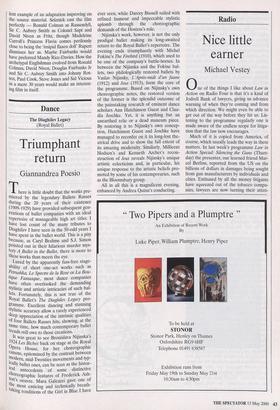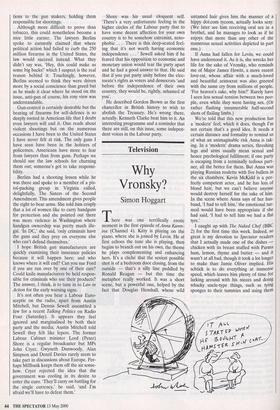Radio
Nice little earner
Michael Vestey
One of the things I like about Law in Action on Radio Four is that it's a kind of Jodrell Bank of lawyers, giving us advance warning of when they're coming and from which direction. We might even be able to get out of the way before they hit us. Lis- tening to the programme regularly one is made aware of the endless scope for litiga- tion that the law now encourages.
Much of it is copied from America, of course, which usually leads the way in these matters. In last week's programme Law in Action Special: Silencing the Guns (Thurs- day) the presenter, our learned friend Mar- cel Berlins, reported from the US on the billions of dollars in damages being sought from gun manufacturers by individuals and cities. Enthused by all the money litigants have squeezed out of the tobacco compa- nies, lawyers are now turning their atten- tions to the gun makers, holding them responsible for shootings.
Although more difficult to prove than tobacco, this could nonetheless become a nice little earner. The lawyers Berlins spoke to earnestly claimed that where political action had failed to curb the 250 million firearms in the United States, the law would succeed instead. What they didn't say was, 'Hey, this could make us some big bucks!' which I suspect is the real reason behind it. Touchingly, however, Berlins seemed to think they were driven more by a social conscience than greed but as he made it clear where he stood on the issue, anti-gun of course, his rosy view was understandable.
Gun-control is certainly desirable but the bearing of firearms for self-defence is so deeply rooted in American life that I doubt even lawyers will end it. One reads about violent shootings but on the numerous occasions I have been to the United States I have never felt at risk. The only guns I have seen have been in the holsters of policemen. Americans have more to fear from lawyers than from guns. Perhaps we should sue the law schools for churning them out; someone's got to take responsi- bility.
Berlins had a shooting lesson while he was there and spoke to a member of a pis- tol-packing group in Virginia called, delightfully, The Sisters of the Second Amendment. This amendment gives people the right to bear arms. She told him crisply that a lot of women like to carry handguns for protection and she pointed out there was more violence in Washington where handgun ownership was pretty much ille- gal. 'In DC,' she said, 'only criminals have the guns and they prey on everyone else who can't defend themselves.'
I hope British gun manufacturers are quickly examining their insurance policies because it will happen here; and who knows where it will end? Can you sue Ford if you are run over by one of their cars? Could knife manufacturers be held respon- sible for criminals who use their products? The answer, I think, is to tune in to Law in Action for the early warning signs.
It's not often you hear a Labour Euro- sceptic on the radio, apart from Austin Mitchell, but Dennis Sewell assembled a few for a recent Talking Politics on Radio Four (Saturday). It appears they feel ignored and marginalised by both their party and the media; Austin Mitchell told Sewell they felt like lepers. The former Labour Cabinet minister Lord (Peter) Shore is a regular broadcaster but MPs John Cryer, Gwyneth Dunwoody, Alan Simpson and Denzil Davies rarely seem to take part in discussions about Europe. Per- haps Millbank keeps them off the air some- how. Cryer rejected the idea that the government was cooling in its desire to enter the euro. 'They'll carry on battling for the single currency,' he said, 'and I'm afraid we'll have to defeat them.' Shore was his usual eloquent self. `There's a very unfortunate feeling in the higher circles of the Labour party that to have some decent affection for your own country is to be somehow extremist, xeno- phobic . . . There is this deep-seated feel- ing that it's not worth having economic independence . . . ' Sewell asked him if he feared that his opposition to economic and monetary union would tear the party apart and he had a good answer to that. He said that if you put party unity before the elec- torate's rights as voters and democrats 'and before the independence of their own country, they would be, rightly, ashamed of you'.
He described Gordon Brown as the first chancellor in British history to wish to abolish the Treasury. He's wrong there, actually. Kenneth Clarke beat him to it. An interesting programme and a reminder that there are still, on this issue, some indepen- dent voices in the Labour party.



























































 Previous page
Previous page